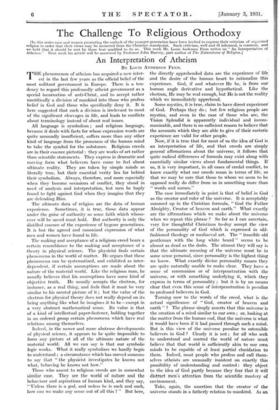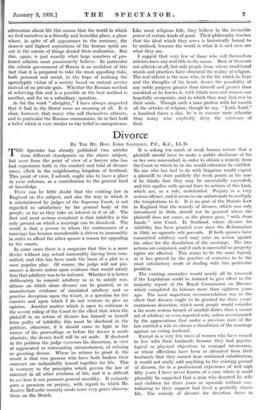The Challenge To Religious Orthodoxy [In this series men and
women presenting the outlook of the younger generation have been invited to express their criticism of organized religion in order that their views may be answered from the Christian standpoint. Such criticism, well and ill informed, is common. and: we hold that it should be met by those best qualified to do so. This week Mr. Louis Anderson Fenn writes on " An Interpretation of. Atheism." Next week his article will be answered by Professor John Harvey, part author of The Naturalne..88 of Religion.] An Interpretation of Atheism
BY LOUIS ANDERSON FENN.
THE phenomenon of atheism has acquired a new inter- est in the last few years as the official belief of the most militant government in Europe. There is a ten- dency to regard this professedly atheist government as a special incarnation of anti-Christ, and to accept rather uncritically a division of mankind into those who profess belief in God and those who specifically deny it. It is here suggested that such a division is irrelevant to most of the significant cleavages in life, and leads to conflicts about terminology instead of about real issues.
All language is symbolism ; and religious, language, because it deals with facts for whose expression words are quite unusually insufficient, suffers more than any other kind of language from the proneness of the human mind to take the symbol for the substance. Religious creeds are in their essence pictorial : they are works of art rather than scientific statements. They express in dramatic and moving form what believers have come to feel about ultimate reality. They are taken by simple minds as literally true, but their essential verity lies far behind their symbolism. Always, therefore, and more especially when they become occasions of conflict, they stand in need of analysis and interpretation, lest men be haply found to fight against God when they imagine that they are defending Him.
The ultimate data of religion are the data of human experience. Sometimes, it is true, those data appear under the guise of authority as some faith which whoso- ever will be saved must hold. But authority is only the distilled essence of the experience of bygone generations. It is but the agreed and canonized expression of what men and women have found in life.
The making and acceptance of a religious creed bears a certain resemblance to the making and acceptance of a theory in physical science. The physicist finds certain phenomena in the world of matter. He argues that these phenomena can be systematized, and exhibited as inter- dependent, if certain assumptions are made about the nature of the material world. Like the religious man, he usually believes that his assumptions have some kind of objective truth. He usually accepts the electron, for instance, as a real thing, and feels that it must be very similar to his mental picture of it ; but the value of the electron for physical theory does not really depend on its being anything like what he imagines it to be—except in a very abstract mathematical sense. Its value is that of a kind of intellectual paper-fastener, holding together in an ordered group certain phenomena which have real relations among themselves.
Indeed, in the newer and more abstruse developments of physical science, it appears to be quite impossible to form any picture at all of the ultimate nature of the material world. All we can say is that our symbolic logic works. What it really symbolizes we hardly begin to understand ; a circumstance which has moved someone to say that " the physicist investigates he knows not what, behaving he knows not how."
Those who assent to religious creeds are in somewhat similar case. They see the world of nature and the behaviour and aspirations of human kind, and they say, "Unless there is a god, and unless he is such and such, how can we make any sense out of all this ? " But here, the directly apprehended data are the experience of life and the desire of the human heart to rationalize this experience. God, if and whatever He be, is from our human angle derivative and hypothetical. Like the electron, He may be real enough, but He is not the reality which we immediately apprehend. Some mystics, it is true, claim to have direct experience' of God. Perhaps they do ; but few religious people are mystics, and even in the case of those who are, the Vision Splendid is apparently individual and incom- municable, and there is no sufficient reason to believe that the accounts which they are able to give of their esoteric experience are valid for other people.
Now, if it is true that for most of us the idea of God is an interpretation of life, and that creeds are simply general affirmations about the universe, it follows that quite radical differences of formula may exist along with essentially similar views about fundamental things. If so, it is very important, in all cases of credal conflict, to know exactly what our creeds mean in terms of life, so that we may be sure that those to whom we seem to be opposed really do differ from us in something more than " words and names."
The case immediately in point is that of belief in God as the creator and ruler of the universe. It is acceptably summed up in the Christian formula, " God the Father Almighty, Creator of heaven and earth." What exactly are the affirmations which we make about the universe when we repeat this phrase ? So far as I can ascertain, very few thoughtful Christians to-day accept the view of the personality of God which is expressed in old- fashioned theology or mediaeval art. The " irascible old gentleman with the long white beard " seems to be almost as dead as the dodo. The utmost they will say is that the ultimate meaning of the universe must be in some sense personal, since personality is the highest thing we know. What exactly divine personality means they are quite naturally unable to make clear. They have a sense of communion or of interpenetration with the universe, or with something underlying it, which they express in terms of personality ; but it is by no means clear that even this sense of interpenetration is peculiar to professed believers in God.
Turning now to the words of the creed, what is the actual significance of " God, creator of heaven and earth " ? The phrase simply asserts that this universe is -the creation of a mind similar to our own ; or, looking at the matter from the human end, that the universe is what it would have been if it had passed through such a mind. But is this view of the universe peculiar to ostensible believers in God ? Clearly it is not ; for all who seek to understand and Control the world of nature must believe that that world is sufficiently akin to our own minds to be capable of at least partial elucidation to them. Indeed, most people who profess and call them,. selves atheists are unusually insistent on exactly this possibility of understanding and control : they object to the idea of God partly because they fear that it will distract men's attention from the scientific 'mastery of environment.
Take, again, the assertion that the creator of the universe stands in a fatherly relation to mankind. As an affirmation about life this means that the world in which we find ourselves is a friendly and homelike place, a place where, in spite of all appearance to the contrary, the dearest and highest aspirations of the human spirit are not in the nature of things denied their realization. But this, again, is just exactly what large numbers of pro- fessed atheists most passionately believe.- In particular the atheist government of Russia is so confident of this fact that it is prepared to take the most appalling risks, both personal and social, in the hope of realizing the apocalyptic vision of a society based on mutual service instead of on private gain. Whether the Russian method of achieving this end is a possible or the best method is another, and for us a subsidiary, question.
As for the word " almighty," I have always suspected that it had iu the literal sense no meaning at all. It is clear, however, _that many who call themselves atheists, and in particular the Russian communists, do in fact hold a belief which is very similar to the belief in omnipotence. Like most religious folk, they believe in the invincible power of certain kinds of-good. Their philosophy teaches that the ideal which they serve is historically bound to be realized, because the world is what it is and men are what they are.
I suggest that very few of those who call themselves atheists have any real title to the name. Most of them are not atheists at all, but only people from whom traditional creeds and practices have obscured the reality of religion. The real atheist is the man who, in the life which he lives and the thoughts of his heart, denies the possibility of any noble purpose greater than himself and greater than mankind as he knows it, with which men and women can hopefully co-operate, and in which they may fmd rest to their souls. Though such a man profess with his mouth all the articles of religion, though he say, " Lord, Lord," a hundred times a day, he is in essence more atheistic than many who explicitly deny the existence of God.







































 Previous page
Previous page